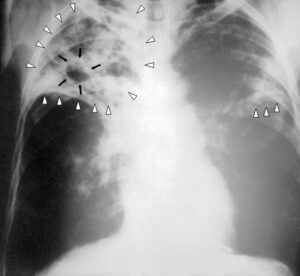Tuberculosis (TB) is one of the world’s leading causes of death from a single infectious agent. It is an infectious disease caused by Mycobacterium tuberculosis, primarily affecting the lungs. TB spreads through the air when an infected person coughs, sneezes, or talks.
Types of Tuberculosis
- Pulmonary TB
- Most commonly seen form of TB
- Primarily affects the lungs
- Coughing up blood and phlegm are characteristic features
- Extra-pulmonary TB
- TB affects parts of the body other than the lungs, including:
- TB Lymphadenitis
- TB Peritonitis
- Bone TB
- Brain TB
- Kidney TB
- TB affects parts of the body other than the lungs, including:
- Latent TB
- The bacteria remain inactive in the body and cause no symptoms
- Individuals with latent TB are not contagious
- Active TB
- In this condition, the bacteria actively multiply within the body, causing symptoms
- Individuals with active TB are contagious
- Multi-drug Resistant TB (MDR-TB)
- Occurs when the incorrect prescription of drugs leads to resistance
- MDR-TB does not respond to the usual medications, requiring more expensive, toxic, and specific drugs
- Treatment is more complicated
Causes
- Tuberculosis is caused by Mycobacterium tuberculosis, a bacterium that typically infects the lungs but can affect other parts of the body.
Symptoms and Features
- Many people with TB do not present any symptoms and are not contagious
- Symptoms, when present, may include:
- Prolonged cough
- Chest pain
- Fatigue and weakness
- Shortness of breath
- Loss of appetite
- Fever
- Night sweats
- Weight loss
- Malaise
- Anorexia
- When the brain is affected, symptoms may include:
- Headache
- Cranial nerve palsies
- Symptoms vary depending on the part of the body affected, as TB can also involve the kidneys, brain, spine, and skin
Individuals at Higher Risk
- People with:
- Diabetes
- HIV or AIDS
- Malnutrition
- Tobacco use
- Alcohol intake
Diagnosis and Tests
- The World Health Organization (WHO) recommends rapid molecular diagnostic tests as initial diagnostic tools:
- Xpert MTB
- Truenat
- Additional diagnostic tests include:
- Tuberculin skin test (TST)
- Interferon-gamma release assay (IGRA)
- Chest X-rays
- CT scans
- Sputum lab test
- Diagnosing multidrug-resistant TB and HIV-associated TB can be complex and costly
- Diagnosing TB in children is particularly challenging
Treatment
- Standard medications prescribed for tuberculosis include:
- Isoniazid
- Rifampin
- Ethambutol
- Pyrazinamide
- Rifapentine
- For multidrug-resistant TB (MDR-TB), alternative medications include:
- Bedaquiline
- Linezolid
- Levofloxacin
- Moxifloxacin
Prevention
- Key preventive measures include:
- Wash hands thoroughly and often
- Coughing into your elbow or covering your mouth when coughing
- Avoiding close contact with others
- Vaccination with the BCG vaccine
Additional Information
- TB most commonly affects adults in their most productive years, but all age groups are at risk
- Over 80% of TB cases and deaths occur in low- and middle-income countries

